Cloud computing—a mix of software-enabled resources and services that can be delivered to a user on an as-needed basis—is the engine that drives today’s global, cross-border business. But when it comes to a consistent legal, structural and regulatory framework to deliver these services, developing countries like India, China and Brazil—increasingly targeted for global growth by insurance carriers and other industries—are seriously lagging, according to a new study by the
Business Software Alliance (BSA), an international IT industry group with policy, legal and/or educational programs in 80 countries. In its newly released
Global Cloud Computing Scorecard, BSA ranks the “cloud readiness” of 24 countries that account for 80 percent of the global information and communications technology (ICT) market based on seven policy categories: 1.
Data privacy: Balance between laws and regulations and free ability to move data through the cloud efficiently 2.
Security: Proper management of risks inherent in storing and running applications in the cloud 3.
Cybercrime: Laws providing meaningful deterrence and clear causes of action 4.
Intellectual property rights: Intellectual property laws should provide for clear protection and enforcement against misappropriation and infringement 5.
Support for industry-led standards and international rules harmonization: Government/industry standards collaboration to promote openness and interoperability 6.
Promoting free trade: Elimination of barriers to free trade, including preferences for products or providers 7.
ICT readiness, broadband deployment: Policies promoting private sector investment in broadband infrastructure and laws promoting universal access to broadband. BSA ranked each country by ranking them on individual criteria in each of the seven categories. The rankings ran from the highest score of 83.3 to the lowest of 35.1. Click “next” to view the slideshow of the top 12 cloud-ready countries.
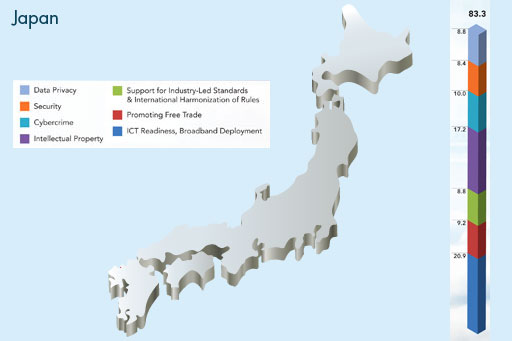 1. Japan Total score: 83.3
1. Japan Total score: 83.3 Data privacy: 8.8 Security: 8.4 Cybercrime: 10.0 Intellectual property: 17.2 Support for industry-led standards: 8.8 Promoting free trade: 9.2 ICT readiness: 20.9 “Those interested in advancing cloud computing can find a model in Japan,” BSA writes. “Japan has a comprehensive suite of modern laws that support and facilitate the digital economy and cloud computing—from comprehensive privacy legislation that avoids burdens on data transfers and data controllers to a full range of criminal and IP law protections. Further, Japan is a leader in the development of international standards related to cloud computing, and the country is working to provide all households with high-speed fiber broadband connections in the next 3 years.” Japan also is among the countries that are members of the
WTO Agreement on Government Procurement, which liberalizes such policies.
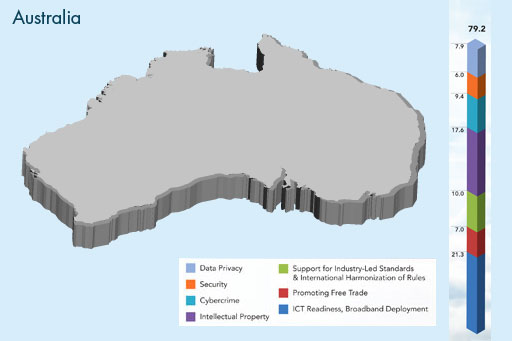 2. Australia Total score: 79.2
2. Australia Total score: 79.2 Data privacy: 7.9 Security: 6.0 Cybercrime: 9.4 Intellectual property: 17.6 Support for industry-led standards: 10.0 Promoting free trade: 7.0 ICT readiness: 21.3 Major national broadband network infrastructure improvements are underway in Australia and a range of EU countries.
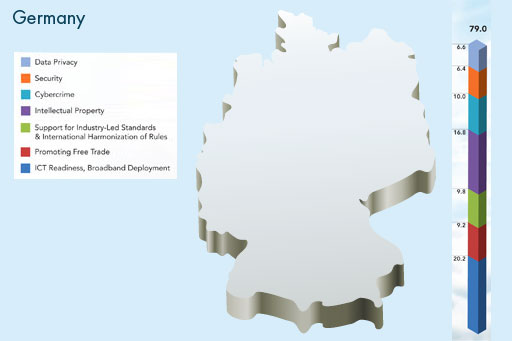 3. Germany Total score: 79.0
3. Germany Total score: 79.0 Data privacy: 6.6 Security: 6.4 Cybercrime: 10.0 Intellectual property: 16.8 Support for industry-led standards: 9.8 Promoting free trade: 9.2 ICT readiness: 20.2 “Germany…is a country that scores well in the initial Scorecard, but it threatens to undermine that advantage with overly restrictive legal interpretations to keep some data within national borders,” BSA writes.
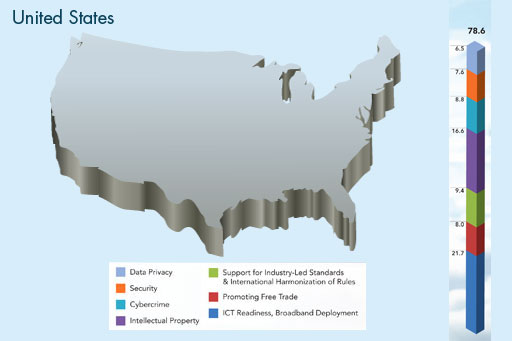 4. United States Total score: 78.6
4. United States Total score: 78.6 Data privacy: 6.5 Security: 7.6 Cybercrime: 8.8 Intellectual property: 16.6 Support for industry-led standards: 9.4 Promoting free trade: 8.0 ICT readiness: 21.7 The U.S., along with EU members and Japan, has laws that are broadly compliant with the
Convention on Cybercrime. The U.S.’s
National Institute for Standards and Technology is “carefully eyeing cloud computing,” and the U.S. finished third in the section for support of industry-led standards and international harmonization of rules.
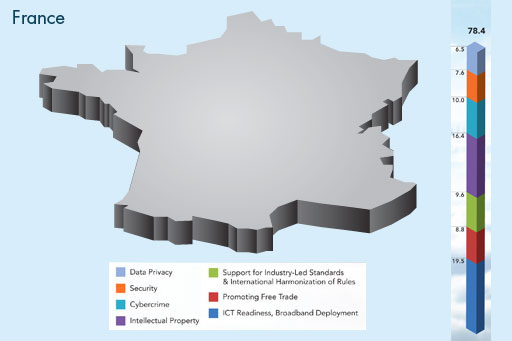 5. France Total score: 78.4
5. France Total score: 78.4 Data privacy: 6.5 Security: 7.6 Cybercrime: 10.0 Intellectual property: 16.4 Support for industry-led standards: 9.6 Promoting free trade: 8.8 ICT readiness: 19.5
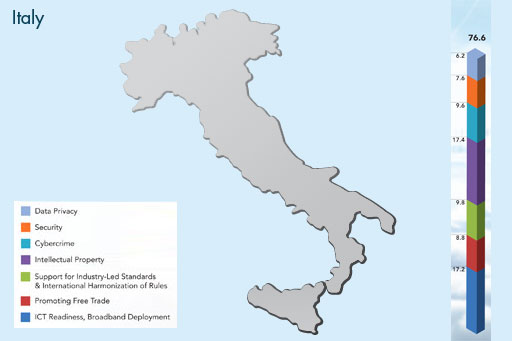 6. Italy Total score: 76.6
6. Italy Total score: 76.6 Data privacy: 6.2 Security: 7.6 Cybercrime: 9.6 Intellectual property: 17.4 Support for industry-led standards: 9.8 Promoting free trade: 8.8 ICT readiness: 17.2
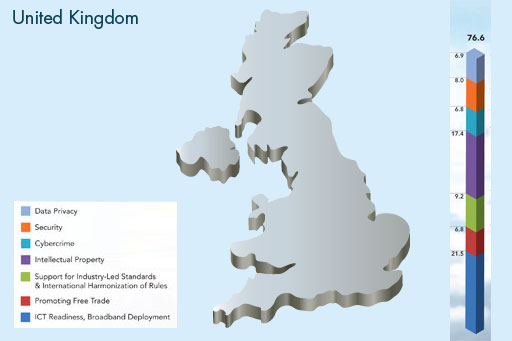 7. United Kingdom Total score: 76.6
7. United Kingdom Total score: 76.6 Data privacy: 6.9 Security: 8.0 Cybercrime: 6.8 Intellectual property: 17.4 Support for industry-led standards: 9.2 Promoting free trade: 6.8 ICT readiness: 21.5
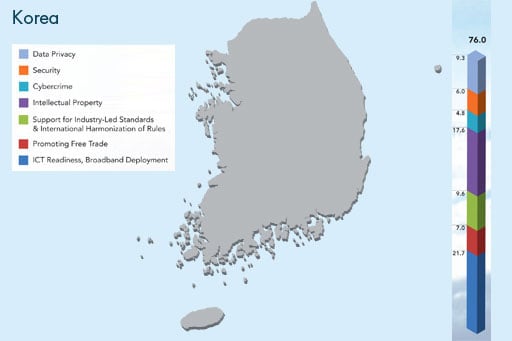 8. Korea Total score: 76.0
8. Korea Total score: 76.0 Data privacy: 9.3 Security: 6.0 Cybercrime: 4.8 Intellectual property: 17.6 Support for industry-led standards: 9.6 Promoting free trade: 7.0 ICT readiness: 21.7 “Korea, which replaced its patchwork of privacy protections with modern and comprehensive legislation in 2011, scored 9.3 out of 10 available points to top the Scorecard’s rankings in the privacy section,” although the country has also implemented Internet filtering or censorship regimes “that may act as a barrier to the expansion of the digital economy and cloud computing.”
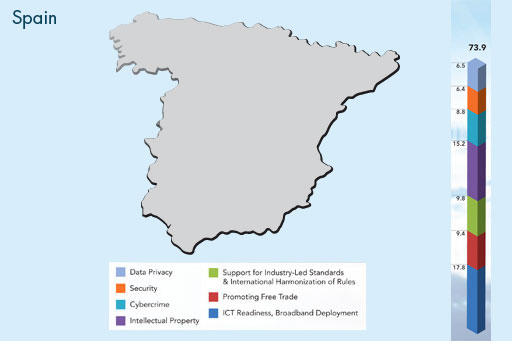 9. Spain Total score: 73.9
9. Spain Total score: 73.9 Data privacy: 6.5 Security: 6.4 Cybercrime: 8.8 Intellectual property: 15.2 Support for industry-led standards: 9.8 Promoting free trade: 9.4 ICT readiness: 17.8
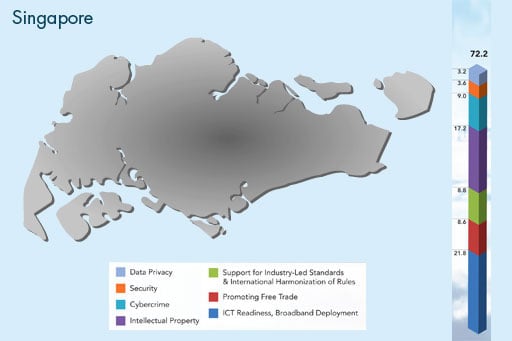 10. Singapore Total score: 72.2
10. Singapore Total score: 72.2 Data privacy: 3.2 Security: 3.6 Cybercrime: 9.0 Intellectual property: 17.2 Support for industry-led standards: 8.8 Promoting free trade: 8.6 ICT readiness: 21.8 Singapore, along with Russia and Malaysia, has signed/ratified the
UN Convention on Electronic Contracting, leading to greater harmonization.
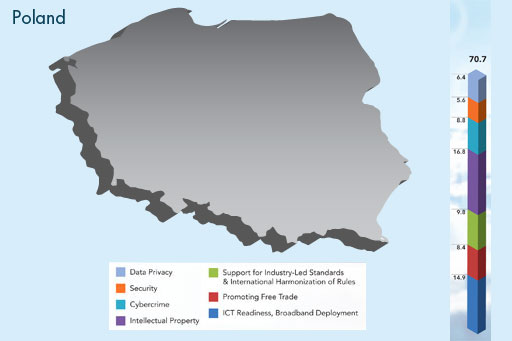 11. Poland Total score: 70.7
11. Poland Total score: 70.7 Data privacy: 6.4 Security: 5.6 Cybercrime: 8.8 Intellectual property: 16.8 Support for industry-led standards: 9.8 Promoting free trade: 8.4 ICT readiness: 14.9
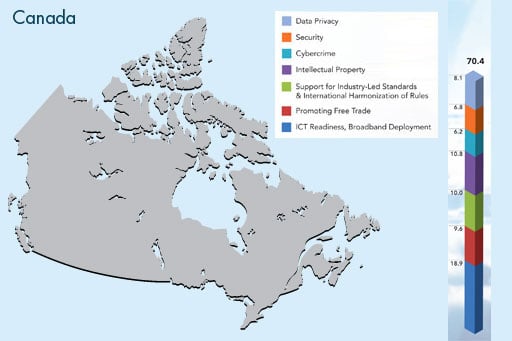 12. Canada Total score: 70.4
12. Canada Total score: 70.4 Data privacy: 8.1 Security: 6.8 Cybercrime: 6.2 Intellectual property: 10.8 Support for industry-led standards: 10.0 Promoting free trade: 9.6 ICT readiness: 18.9 Although Canada signed the
Council of Europe Cybercrime Convention in 2001, it has failed to ratify the Convention for more than a decade; and while it has a comprehensive computer crime law in place, it lacks essential online investigation and enforcement tools, according to BSA. Additionally, gaps exist in the IP laws of Canada. Click on the next page to see Nos. 13 to 24 in the BSA ranking.
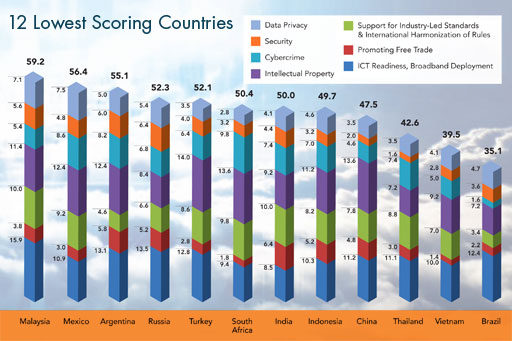





 Copyright © 2024 ALM Global, LLC. All Rights Reserved.
Copyright © 2024 ALM Global, LLC. All Rights Reserved.



 1. Japan Total score: 83.3 Data privacy: 8.8 Security: 8.4 Cybercrime: 10.0 Intellectual property: 17.2 Support for industry-led standards: 8.8 Promoting free trade: 9.2 ICT readiness: 20.9 “Those interested in advancing cloud computing can find a model in Japan,” BSA writes. “Japan has a comprehensive suite of modern laws that support and facilitate the digital economy and cloud computing—from comprehensive privacy legislation that avoids burdens on data transfers and data controllers to a full range of criminal and IP law protections. Further, Japan is a leader in the development of international standards related to cloud computing, and the country is working to provide all households with high-speed fiber broadband connections in the next 3 years.” Japan also is among the countries that are members of the
1. Japan Total score: 83.3 Data privacy: 8.8 Security: 8.4 Cybercrime: 10.0 Intellectual property: 17.2 Support for industry-led standards: 8.8 Promoting free trade: 9.2 ICT readiness: 20.9 “Those interested in advancing cloud computing can find a model in Japan,” BSA writes. “Japan has a comprehensive suite of modern laws that support and facilitate the digital economy and cloud computing—from comprehensive privacy legislation that avoids burdens on data transfers and data controllers to a full range of criminal and IP law protections. Further, Japan is a leader in the development of international standards related to cloud computing, and the country is working to provide all households with high-speed fiber broadband connections in the next 3 years.” Japan also is among the countries that are members of the  2. Australia Total score: 79.2 Data privacy: 7.9 Security: 6.0 Cybercrime: 9.4 Intellectual property: 17.6 Support for industry-led standards: 10.0 Promoting free trade: 7.0 ICT readiness: 21.3 Major national broadband network infrastructure improvements are underway in Australia and a range of EU countries.
2. Australia Total score: 79.2 Data privacy: 7.9 Security: 6.0 Cybercrime: 9.4 Intellectual property: 17.6 Support for industry-led standards: 10.0 Promoting free trade: 7.0 ICT readiness: 21.3 Major national broadband network infrastructure improvements are underway in Australia and a range of EU countries.  3. Germany Total score: 79.0 Data privacy: 6.6 Security: 6.4 Cybercrime: 10.0 Intellectual property: 16.8 Support for industry-led standards: 9.8 Promoting free trade: 9.2 ICT readiness: 20.2 “Germany…is a country that scores well in the initial Scorecard, but it threatens to undermine that advantage with overly restrictive legal interpretations to keep some data within national borders,” BSA writes.
3. Germany Total score: 79.0 Data privacy: 6.6 Security: 6.4 Cybercrime: 10.0 Intellectual property: 16.8 Support for industry-led standards: 9.8 Promoting free trade: 9.2 ICT readiness: 20.2 “Germany…is a country that scores well in the initial Scorecard, but it threatens to undermine that advantage with overly restrictive legal interpretations to keep some data within national borders,” BSA writes.  4. United States Total score: 78.6 Data privacy: 6.5 Security: 7.6 Cybercrime: 8.8 Intellectual property: 16.6 Support for industry-led standards: 9.4 Promoting free trade: 8.0 ICT readiness: 21.7 The U.S., along with EU members and Japan, has laws that are broadly compliant with the
4. United States Total score: 78.6 Data privacy: 6.5 Security: 7.6 Cybercrime: 8.8 Intellectual property: 16.6 Support for industry-led standards: 9.4 Promoting free trade: 8.0 ICT readiness: 21.7 The U.S., along with EU members and Japan, has laws that are broadly compliant with the  5. France Total score: 78.4 Data privacy: 6.5 Security: 7.6 Cybercrime: 10.0 Intellectual property: 16.4 Support for industry-led standards: 9.6 Promoting free trade: 8.8 ICT readiness: 19.5
5. France Total score: 78.4 Data privacy: 6.5 Security: 7.6 Cybercrime: 10.0 Intellectual property: 16.4 Support for industry-led standards: 9.6 Promoting free trade: 8.8 ICT readiness: 19.5  6. Italy Total score: 76.6 Data privacy: 6.2 Security: 7.6 Cybercrime: 9.6 Intellectual property: 17.4 Support for industry-led standards: 9.8 Promoting free trade: 8.8 ICT readiness: 17.2
6. Italy Total score: 76.6 Data privacy: 6.2 Security: 7.6 Cybercrime: 9.6 Intellectual property: 17.4 Support for industry-led standards: 9.8 Promoting free trade: 8.8 ICT readiness: 17.2  7. United Kingdom Total score: 76.6 Data privacy: 6.9 Security: 8.0 Cybercrime: 6.8 Intellectual property: 17.4 Support for industry-led standards: 9.2 Promoting free trade: 6.8 ICT readiness: 21.5
7. United Kingdom Total score: 76.6 Data privacy: 6.9 Security: 8.0 Cybercrime: 6.8 Intellectual property: 17.4 Support for industry-led standards: 9.2 Promoting free trade: 6.8 ICT readiness: 21.5  8. Korea Total score: 76.0 Data privacy: 9.3 Security: 6.0 Cybercrime: 4.8 Intellectual property: 17.6 Support for industry-led standards: 9.6 Promoting free trade: 7.0 ICT readiness: 21.7 “Korea, which replaced its patchwork of privacy protections with modern and comprehensive legislation in 2011, scored 9.3 out of 10 available points to top the Scorecard’s rankings in the privacy section,” although the country has also implemented Internet filtering or censorship regimes “that may act as a barrier to the expansion of the digital economy and cloud computing.”
8. Korea Total score: 76.0 Data privacy: 9.3 Security: 6.0 Cybercrime: 4.8 Intellectual property: 17.6 Support for industry-led standards: 9.6 Promoting free trade: 7.0 ICT readiness: 21.7 “Korea, which replaced its patchwork of privacy protections with modern and comprehensive legislation in 2011, scored 9.3 out of 10 available points to top the Scorecard’s rankings in the privacy section,” although the country has also implemented Internet filtering or censorship regimes “that may act as a barrier to the expansion of the digital economy and cloud computing.”  9. Spain Total score: 73.9 Data privacy: 6.5 Security: 6.4 Cybercrime: 8.8 Intellectual property: 15.2 Support for industry-led standards: 9.8 Promoting free trade: 9.4 ICT readiness: 17.8
9. Spain Total score: 73.9 Data privacy: 6.5 Security: 6.4 Cybercrime: 8.8 Intellectual property: 15.2 Support for industry-led standards: 9.8 Promoting free trade: 9.4 ICT readiness: 17.8  10. Singapore Total score: 72.2 Data privacy: 3.2 Security: 3.6 Cybercrime: 9.0 Intellectual property: 17.2 Support for industry-led standards: 8.8 Promoting free trade: 8.6 ICT readiness: 21.8 Singapore, along with Russia and Malaysia, has signed/ratified the
10. Singapore Total score: 72.2 Data privacy: 3.2 Security: 3.6 Cybercrime: 9.0 Intellectual property: 17.2 Support for industry-led standards: 8.8 Promoting free trade: 8.6 ICT readiness: 21.8 Singapore, along with Russia and Malaysia, has signed/ratified the  11. Poland Total score: 70.7 Data privacy: 6.4 Security: 5.6 Cybercrime: 8.8 Intellectual property: 16.8 Support for industry-led standards: 9.8 Promoting free trade: 8.4 ICT readiness: 14.9
11. Poland Total score: 70.7 Data privacy: 6.4 Security: 5.6 Cybercrime: 8.8 Intellectual property: 16.8 Support for industry-led standards: 9.8 Promoting free trade: 8.4 ICT readiness: 14.9  12. Canada Total score: 70.4 Data privacy: 8.1 Security: 6.8 Cybercrime: 6.2 Intellectual property: 10.8 Support for industry-led standards: 10.0 Promoting free trade: 9.6 ICT readiness: 18.9 Although Canada signed the
12. Canada Total score: 70.4 Data privacy: 8.1 Security: 6.8 Cybercrime: 6.2 Intellectual property: 10.8 Support for industry-led standards: 10.0 Promoting free trade: 9.6 ICT readiness: 18.9 Although Canada signed the 





